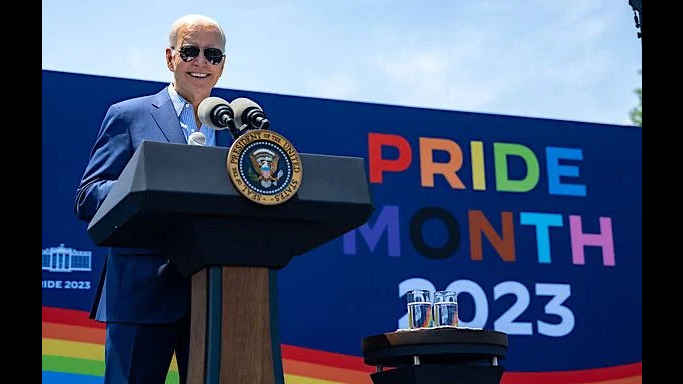On June 10, 2023, President Joe Biden addressed the significance of Pansexual and Panromantic Pride Day during remarks made on the South Lawn of the White House. The Department of Health and Human Services (HHS) echoed his sentiments, emphasizing the importance of recognition and support for all individuals, regardless of whom they love. The HHS shared a post on the social media platform X, stating, “Everyone deserves to feel seen, respected, and supported,” and urged the creation of a world where everyone can take pride in their identity. This declaration marks a continuation of the Biden administration’s commitment to LGBTQ+ rights and inclusivity, underscoring the significance of visibility for diverse sexual and romantic orientations, particularly those beyond the traditional binary definitions.
The acknowledgment of Pansexual and Panromantic Pride Day sparked varied reactions online. Notable figures, including Elon Musk, offered mockery and confusion rather than support. Musk’s response, expressing his lack of understanding about the meaning of the celebration, resonated with other conservative voices who were quick to criticize the initiative. Individuals such as Stephen Miller and Jim Banks ridiculed the HHS post, suggesting that the focus should be shifted toward more pressing issues like healthcare costs, arguing that such celebrations are a distraction from significant national concerns. Their reactions illustrate the polarization surrounding LGBTQ+ events and highlight a broader societal debate about the prioritization of cultural recognition versus substantive policy changes.
In an educational context, pansexuality refers to a romantic or sexual attraction that is not confined by gender, allowing for a broader interpretation of relationships. Similarly, panromanticism is characterized by the capacity for romantic attraction without the sexual dimension. Organizations like Workplace Pride clarify that individuals who identify as pansexual or panromantic prioritize personal connections over traditional gender norms, indicating that attraction is not a universal experience but varies from person to person. Discussions around these orientations often aim to counter misunderstandings and stereotypes, emphasizing the right to self-identify and express diverse relationship dynamics in a supportive environment.
The annual celebration of Pansexual and Panromantic Pride Day serves multiple purposes within the LGBTQ+ community. It is not only a time for celebration but also a critical opportunity to raise awareness about the realities faced by pansexual and panromantic individuals. As highlighted by organizations such as The Rainbow Stores, this day encourages the sharing of personal narratives and the discussion of issues that disproportionately affect members of the pansexual community. The emphasis on visibility and representation is crucial in fostering understanding in a society that often marginalizes non-binary identities, thereby promoting greater empathy and acceptance.
Opposition to these celebrations often stems from a broader cultural context where LGBTQ+ rights are still heavily contested. Critics argue that events like Pansexual and Panromantic Pride Day detract from more significant issues and reflect a broader agenda that they perceive as problematic. This contention points to the challenges in bridging dialogues between those who champion LGBTQ+ rights and those who critique them on moral, political, or practical grounds. The response from conservative political figures and commentators illustrates an enduring societal divide, wherein expressions of identity are frequently interwoven with political ideologies, influencing public discourse and policy formulation.
In conclusion, the discussions surrounding Pansexual and Panromantic Pride Day encapsulate ongoing debates about identity, representation, and the value of inclusivity within American society. As officials like President Biden and institutions like the HHS continue to endorse and promote such events, they face backlash from conservative voices that challenge the need for celebration and recognition of diverse identities. However, these conversations also provide a platform for raising awareness, fostering understanding, and advocating for policies that support marginalized communities. Understanding and supporting diverse sexual orientations and identities remain central to the broader struggle for equality and acceptance, ultimately contributing to a more inclusive society.

